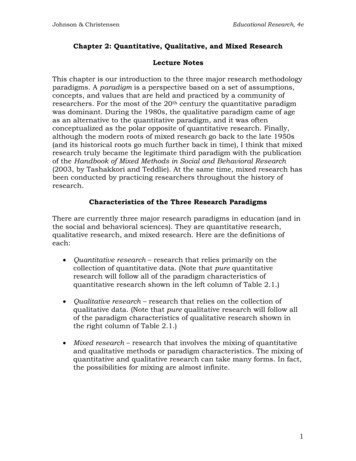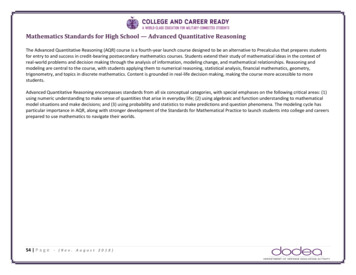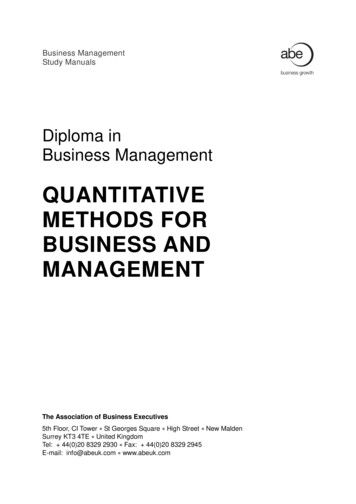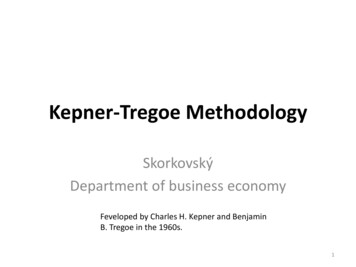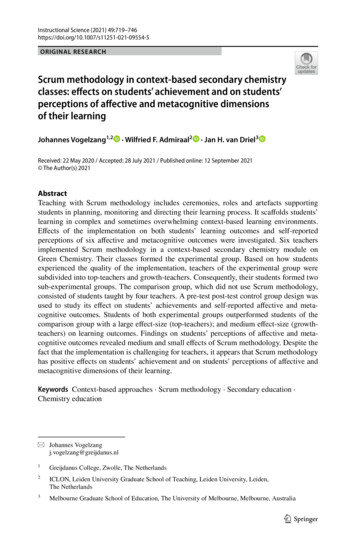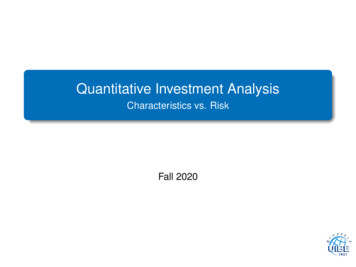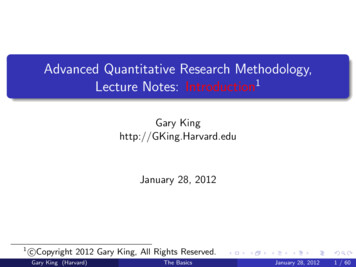
Transcription
Advanced Quantitative Research Methodology,Lecture Notes: Introduction1Gary Kinghttp://GKing.Harvard.eduJanuary 28, 20121c Copyright 2012 Gary King, All Rights Reserved.Gary King (Harvard)The BasicsJanuary 28, 20121 / 60
What’s this Course About?Gary King (Harvard)The Basics2 / 60
What’s this Course About?Inference: Using facts you know to learn about facts you don’t knowGary King (Harvard)The Basics2 / 60
What’s this Course About?Inference: Using facts you know to learn about facts you don’t knowSpecific statistical methods for many research problemsGary King (Harvard)The Basics2 / 60
What’s this Course About?Inference: Using facts you know to learn about facts you don’t knowSpecific statistical methods for many research problemsHow to learn (or create) new methodsGary King (Harvard)The Basics2 / 60
What’s this Course About?Inference: Using facts you know to learn about facts you don’t knowSpecific statistical methods for many research problemsHow to learn (or create) new methods(Statistical simulation and programming as practical tools)Gary King (Harvard)The Basics2 / 60
What’s this Course About?Inference: Using facts you know to learn about facts you don’t knowSpecific statistical methods for many research problemsHow to learn (or create) new methods(Statistical simulation and programming as practical tools)How to write a publishable scholarly paperGary King (Harvard)The Basics2 / 60
What’s this Course About?Inference: Using facts you know to learn about facts you don’t knowSpecific statistical methods for many research problemsHow to learn (or create) new methods(Statistical simulation and programming as practical tools)How to write a publishable scholarly paperThe syllabus gives an outline instead of a weekly plan.Gary King (Harvard)The Basics2 / 60
What’s this Course About?Inference: Using facts you know to learn about facts you don’t knowSpecific statistical methods for many research problemsHow to learn (or create) new methods(Statistical simulation and programming as practical tools)How to write a publishable scholarly paperThe syllabus gives an outline instead of a weekly plan.We will go as fast as possible subject to everyone following along andcover different amounts of material each weekGary King (Harvard)The Basics2 / 60
What’s this Course About?Inference: Using facts you know to learn about facts you don’t knowSpecific statistical methods for many research problemsHow to learn (or create) new methods(Statistical simulation and programming as practical tools)How to write a publishable scholarly paperThe syllabus gives an outline instead of a weekly plan.We will go as fast as possible subject to everyone following along andcover different amounts of material each weekSee outline (and all class materials) atj.mp/G2001Gary King (Harvard)The Basics2 / 60
Who Takes This Course?Gary King (Harvard)The Basics3 / 60
Who Takes This Course?Anyone who wants to learn how to do empirical research in depth.Gary King (Harvard)The Basics3 / 60
Who Takes This Course?Anyone who wants to learn how to do empirical research in depth.Perspective: use abstract statistical theory when useful, and alwaystraverse from theoretical foundations to practical applications.Gary King (Harvard)The Basics3 / 60
Who Takes This Course?Anyone who wants to learn how to do empirical research in depth.Perspective: use abstract statistical theory when useful, and alwaystraverse from theoretical foundations to practical applications.Most Gov Dept grad students doing empirical work (its the 2ndcourse in their methods sequence)Gary King (Harvard)The Basics3 / 60
Who Takes This Course?Anyone who wants to learn how to do empirical research in depth.Perspective: use abstract statistical theory when useful, and alwaystraverse from theoretical foundations to practical applications.Most Gov Dept grad students doing empirical work (its the 2ndcourse in their methods sequence)Grad students from other departments and schools (Gov2001),undergrads (Gov1002), visitors, faculty, and other students (E-2001).Gary King (Harvard)The Basics3 / 60
Who Takes This Course?Anyone who wants to learn how to do empirical research in depth.Perspective: use abstract statistical theory when useful, and alwaystraverse from theoretical foundations to practical applications.Most Gov Dept grad students doing empirical work (its the 2ndcourse in their methods sequence)Grad students from other departments and schools (Gov2001),undergrads (Gov1002), visitors, faculty, and other students (E-2001).A correlate of whether you have the background. What’s this?b (X 0 X ) 1 X 0 yGary King (Harvard)The Basics3 / 60
RequirementsGary King (Harvard)The Basics4 / 60
Requirements1Weekly assignmentsGary King (Harvard)The Basics4 / 60
Requirements1Weekly assignmentsReadings, short videos, and written workGary King (Harvard)The Basics4 / 60
Requirements1Weekly assignmentsReadings, short videos, and written workTake notes, read carefully, don’t skip equations.Gary King (Harvard)The Basics4 / 60
Requirements1Weekly assignmentsReadings, short videos, and written workTake notes, read carefully, don’t skip equations.2One “publishable” coauthored paper. (Easier than you think!)Gary King (Harvard)The Basics4 / 60
Requirements1Weekly assignmentsReadings, short videos, and written workTake notes, read carefully, don’t skip equations.2One “publishable” coauthored paper. (Easier than you think!)Many class papers have been published, presented at conferences,become dissertations or senior theses, and won many awardsGary King (Harvard)The Basics4 / 60
Requirements1Weekly assignmentsReadings, short videos, and written workTake notes, read carefully, don’t skip equations.2One “publishable” coauthored paper. (Easier than you think!)Many class papers have been published, presented at conferences,become dissertations or senior theses, and won many awardsUndergrads have often had professional journal publicationsGary King (Harvard)The Basics4 / 60
Requirements1Weekly assignmentsReadings, short videos, and written workTake notes, read carefully, don’t skip equations.2One “publishable” coauthored paper. (Easier than you think!)Many class papers have been published, presented at conferences,become dissertations or senior theses, and won many awardsUndergrads have often had professional journal publicationsDraft submission and replication exercise helps a lot.Gary King (Harvard)The Basics4 / 60
Requirements1Weekly assignmentsReadings, short videos, and written workTake notes, read carefully, don’t skip equations.2One “publishable” coauthored paper. (Easier than you think!)Many class papers have been published, presented at conferences,become dissertations or senior theses, and won many awardsUndergrads have often had professional journal publicationsDraft submission and replication exercise helps a lot.See “Publication, Publication”Gary King (Harvard)The Basics4 / 60
Requirements1Weekly assignmentsReadings, short videos, and written workTake notes, read carefully, don’t skip equations.2One “publishable” coauthored paper. (Easier than you think!)Many class papers have been published, presented at conferences,become dissertations or senior theses, and won many awardsUndergrads have often had professional journal publicationsDraft submission and replication exercise helps a lot.See “Publication, Publication”3Participation and collaboration:Gary King (Harvard)The Basics4 / 60
Requirements1Weekly assignmentsReadings, short videos, and written workTake notes, read carefully, don’t skip equations.2One “publishable” coauthored paper. (Easier than you think!)Many class papers have been published, presented at conferences,become dissertations or senior theses, and won many awardsUndergrads have often had professional journal publicationsDraft submission and replication exercise helps a lot.See “Publication, Publication”3Participation and collaboration:Do assignments in groups: “Cheating” is encouraged, so long as youwrite up your work on your own.Gary King (Harvard)The Basics4 / 60
Requirements1Weekly assignmentsReadings, short videos, and written workTake notes, read carefully, don’t skip equations.2One “publishable” coauthored paper. (Easier than you think!)Many class papers have been published, presented at conferences,become dissertations or senior theses, and won many awardsUndergrads have often had professional journal publicationsDraft submission and replication exercise helps a lot.See “Publication, Publication”3Participation and collaboration:Do assignments in groups: “Cheating” is encouraged, so long as youwrite up your work on your own.Participating in a conversation EvesdroppingGary King (Harvard)The Basics4 / 60
Requirements1Weekly assignmentsReadings, short videos, and written workTake notes, read carefully, don’t skip equations.2One “publishable” coauthored paper. (Easier than you think!)Many class papers have been published, presented at conferences,become dissertations or senior theses, and won many awardsUndergrads have often had professional journal publicationsDraft submission and replication exercise helps a lot.See “Publication, Publication”3Participation and collaboration:Do assignments in groups: “Cheating” is encouraged, so long as youwrite up your work on your own.Participating in a conversation EvesdroppingUse collaborative learning tools (we’ll introduce)Gary King (Harvard)The Basics4 / 60
Requirements1Weekly assignmentsReadings, short videos, and written workTake notes, read carefully, don’t skip equations.2One “publishable” coauthored paper. (Easier than you think!)Many class papers have been published, presented at conferences,become dissertations or senior theses, and won many awardsUndergrads have often had professional journal publicationsDraft submission and replication exercise helps a lot.See “Publication, Publication”3Participation and collaboration:Do assignments in groups: “Cheating” is encouraged, so long as youwrite up your work on your own.Participating in a conversation EvesdroppingUse collaborative learning tools (we’ll introduce)Build class camaraderie: preparation counts, particiption counts,working hard to help others learn counts, and building esprit de corpscountsGary King (Harvard)The Basics4 / 60
Got Questions?Gary King (Harvard)The Basics5 / 60
Got Questions?Send and respond to emails: gov2001-l@lists.fas.harvard.eduGary King (Harvard)The Basics5 / 60
Got Questions?Send and respond to emails: gov2001-l@lists.fas.harvard.eduBrowse archive of previous year’s emails (Note which now-famousscholar is asking the question!)Gary King (Harvard)The Basics5 / 60
Got Questions?Send and respond to emails: gov2001-l@lists.fas.harvard.eduBrowse archive of previous year’s emails (Note which now-famousscholar is asking the question!)Q&A annotations in videos, readings, and assignmentsGary King (Harvard)The Basics5 / 60
Got Questions?Send and respond to emails: gov2001-l@lists.fas.harvard.eduBrowse archive of previous year’s emails (Note which now-famousscholar is asking the question!)Q&A annotations in videos, readings, and assignmentsGary King (Harvard)The Basics5 / 60
Got Questions?Send and respond to emails: gov2001-l@lists.fas.harvard.eduBrowse archive of previous year’s emails (Note which now-famousscholar is asking the question!)Q&A annotations in videos, readings, and assignmentsIn-Gary King (Harvard)The Basics5 / 60
Got Questions?Send and respond to emails: gov2001-l@lists.fas.harvard.eduBrowse archive of previous year’s emails (Note which now-famousscholar is asking the question!)Q&A annotations in videos, readings, and assignmentsIn-ter-Gary King (Harvard)The Basics5 / 60
Got Questions?Send and respond to emails: gov2001-l@lists.fas.harvard.eduBrowse archive of previous year’s emails (Note which now-famousscholar is asking the question!)Q&A annotations in videos, readings, and assignmentsIn-ter-ruptGary King (Harvard)The Basics5 / 60
Got Questions?Send and respond to emails: gov2001-l@lists.fas.harvard.eduBrowse archive of previous year’s emails (Note which now-famousscholar is asking the question!)Q&A annotations in videos, readings, and assignmentsIn-ter-rupt me as often as necessaryGary King (Harvard)The Basics5 / 60
Got Questions?Send and respond to emails: gov2001-l@lists.fas.harvard.eduBrowse archive of previous year’s emails (Note which now-famousscholar is asking the question!)Q&A annotations in videos, readings, and assignmentsIn-ter-rupt me as often as necessaryGot a dumb question? Assume you are the smartest person in classand you eventually will be!Gary King (Harvard)The Basics5 / 60
Got Questions?Send and respond to emails: gov2001-l@lists.fas.harvard.eduBrowse archive of previous year’s emails (Note which now-famousscholar is asking the question!)Q&A annotations in videos, readings, and assignmentsIn-ter-rupt me as often as necessaryGot a dumb question? Assume you are the smartest person in classand you eventually will be!When are Gary’s office hours?Gary King (Harvard)The Basics5 / 60
What is the field of statistics?Gary King (Harvard)The Basics6 / 60
What is the field of statistics?The field of statistics originates in the study of politics andgovernment: “state-istics”, (circa 1662)Gary King (Harvard)The Basics6 / 60
What is the field of statistics?The field of statistics originates in the study of politics andgovernment: “state-istics”, (circa 1662)A new field: Random assignment dates to the mid-1930s.Gary King (Harvard)The Basics6 / 60
What is the field of statistics?The field of statistics originates in the study of politics andgovernment: “state-istics”, (circa 1662)A new field: Random assignment dates to the mid-1930s.The modern theory of inference dates only to the 1950s.Gary King (Harvard)The Basics6 / 60
What is the field of statistics?The field of statistics originates in the study of politics andgovernment: “state-istics”, (circa 1662)A new field: Random assignment dates to the mid-1930s.The modern theory of inference dates only to the 1950s.Part of a monumental societal change, the march of quantificationthrough academic, professional, commercial, and policy fields.(Popular books: The Numerati, SuperCrunchers, MoneyBall)Gary King (Harvard)The Basics6 / 60
What is the field of statistics?The field of statistics originates in the study of politics andgovernment: “state-istics”, (circa 1662)A new field: Random assignment dates to the mid-1930s.The modern theory of inference dates only to the 1950s.Part of a monumental societal change, the march of quantificationthrough academic, professional, commercial, and policy fields.(Popular books: The Numerati, SuperCrunchers, MoneyBall)The number of new methods is increasing exponentiallyGary King (Harvard)The Basics6 / 60
What is the field of statistics?The field of statistics originates in the study of politics andgovernment: “state-istics”, (circa 1662)A new field: Random assignment dates to the mid-1930s.The modern theory of inference dates only to the 1950s.Part of a monumental societal change, the march of quantificationthrough academic, professional, commercial, and policy fields.(Popular books: The Numerati, SuperCrunchers, MoneyBall)The number of new methods is increasing exponentiallyMost important methods originate outside the discipline of statistics(random assignment, experimental design, survey research, machinelearning, MCMC methods, . . . ). Statistics abstracts, proves formalproperties, generalizes, and distributes results back out.Gary King (Harvard)The Basics6 / 60
What is the field of statistics?The field of statistics originates in the study of politics andgovernment: “state-istics”, (circa 1662)A new field: Random assignment dates to the mid-1930s.The modern theory of inference dates only to the 1950s.Part of a monumental societal change, the march of quantificationthrough academic, professional, commercial, and policy fields.(Popular books: The Numerati, SuperCrunchers, MoneyBall)The number of new methods is increasing exponentiallyMost important methods originate outside the discipline of statistics(random assignment, experimental design, survey research, machinelearning, MCMC methods, . . . ). Statistics abstracts, proves formalproperties, generalizes, and distributes results back out.Massive change in the evidence base of the social sciences: surveys,end of period government stats, and one-off studies of people, places,or eventsnumerous new types and huge quantities of dataGary King (Harvard)The Basics6 / 60
What is the field of political methodology?Gary King (Harvard)The Basics7 / 60
What is the field of political methodology?The methods subfield of political science, a relative of econometrics,psychological statistics, biostatistics, chemometrics, sociologicalmethodology, etc.Gary King (Harvard)The Basics7 / 60
What is the field of political methodology?The methods subfield of political science, a relative of econometrics,psychological statistics, biostatistics, chemometrics, sociologicalmethodology, etc.Historically, political methodologists were trained in many differentareas, and so the field is heavily interdisciplinary.Gary King (Harvard)The Basics7 / 60
What is the field of political methodology?The methods subfield of political science, a relative of econometrics,psychological statistics, biostatistics, chemometrics, sociologicalmethodology, etc.Historically, political methodologists were trained in many differentareas, and so the field is heavily interdisciplinary.As the cross-roads for other disciplines, it is one of the best places tolearn about methods broadly. It reflects the diverse nature of politicalscience.Gary King (Harvard)The Basics7 / 60
What is the field of political methodology?The methods subfield of political science, a relative of econometrics,psychological statistics, biostatistics, chemometrics, sociologicalmethodology, etc.Historically, political methodologists were trained in many differentareas, and so the field is heavily interdisciplinary.As the cross-roads for other disciplines, it is one of the best places tolearn about methods broadly. It reflects the diverse nature of politicalscience.Second largest APSA Section, after the catchall Comparative PoliticsGary King (Harvard)The Basics7 / 60
What is the field of political methodology?The methods subfield of political science, a relative of econometrics,psychological statistics, biostatistics, chemometrics, sociologicalmethodology, etc.Historically, political methodologists were trained in many differentareas, and so the field is heavily interdisciplinary.As the cross-roads for other disciplines, it is one of the best places tolearn about methods broadly. It reflects the diverse nature of politicalscience.Second largest APSA Section, after the catchall Comparative Politics(Valuable for the job market)Gary King (Harvard)The Basics7 / 60
Course strategyGary King (Harvard)The Basics8 / 60
Course strategyWe could teach you the latest and greatest methods,Gary King (Harvard)The Basics8 / 60
Course strategyWe could teach you the latest and greatest methods, but when yougraduate they will be oldGary King (Harvard)The Basics8 / 60
Course strategyWe could teach you the latest and greatest methods, but when yougraduate they will be oldWe could teach you all the methods that might prove useful duringyour career,Gary King (Harvard)The Basics8 / 60
Course strategyWe could teach you the latest and greatest methods, but when yougraduate they will be oldWe could teach you all the methods that might prove useful duringyour career, but when you graduate you will be oldGary King (Harvard)The Basics8 / 60
Course strategyWe could teach you the latest and greatest methods, but when yougraduate they will be oldWe could teach you all the methods that might prove useful duringyour career, but when you graduate you will be oldInstead, we teach you the fundamentals, the underlying theory ofinference, from which most statistical models are developed.Gary King (Harvard)The Basics8 / 60
Course strategyWe could teach you the latest and greatest methods, but when yougraduate they will be oldWe could teach you all the methods that might prove useful duringyour career, but when you graduate you will be oldInstead, we teach you the fundamentals, the underlying theory ofinference, from which most statistical models are developed.This helps us separate the conventions from underlying statisticaltheory. (How to get an F in Econometrics: follow advice fromPsychometrics. Works in reverse too, even when the foundations areidentical.)Gary King (Harvard)The Basics8 / 60
E.g.,: How to fit a line to a scatterplot?Gary King (Harvard)The Basics9 / 60
E.g.,: How to fit a line to a scatterplot?Gary King (Harvard)The Basics9 / 60
E.g.,: How to fit a line to a scatterplot?a rule (least squares, least absolute deviations, etc)Gary King (Harvard)The Basics9 / 60
E.g.,: How to fit a line to a scatterplot?a rule (least squares, least absolute deviations, etc)visually (tends to be principle components)Gary King (Harvard)The Basics9 / 60
E.g.,: How to fit a line to a scatterplot?a rule (least squares, least absolute deviations, etc)visually (tends to be principle components)criteria (unbiasedness, efficiency, sufficiency, admissibility, etc.)Gary King (Harvard)The Basics9 / 60
E.g.,: How to fit a line to a scatterplot?a rule (least squares, least absolute deviations, etc)visually (tends to be principle components)criteria (unbiasedness, efficiency, sufficiency, admissibility, etc.)from a theory of inference, and for a purpose (like causal estimation,prediction, etc.)Gary King (Harvard)The Basics9 / 60
The FundamentalsGary King (Harvard)The Basics10 / 60
The FundamentalsThe fundamentals help us decide what is junk, new jargon, or agenuine advanceGary King (Harvard)The Basics10 / 60
The FundamentalsThe fundamentals help us decide what is junk, new jargon, or agenuine advanceWe will reinvent existing methods by creating them from scratch.Gary King (Harvard)The Basics10 / 60
The FundamentalsThe fundamentals help us decide what is junk, new jargon, or agenuine advanceWe will reinvent existing methods by creating them from scratch.We will learn: its as easy to invent brand new methods too, whenneeded.Gary King (Harvard)The Basics10 / 60
The FundamentalsThe fundamentals help us decide what is junk, new jargon, or agenuine advanceWe will reinvent existing methods by creating them from scratch.We will learn: its as easy to invent brand new methods too, whenneeded.The fundamentals help us pick up new methods easily.Gary King (Harvard)The Basics10 / 60
The FundamentalsThe fundamentals help us decide what is junk, new jargon, or agenuine advanceWe will reinvent existing methods by creating them from scratch.We will learn: its as easy to invent brand new methods too, whenneeded.The fundamentals help us pick up new methods easily.What’s the “proper” way to teach statistics? Options:Gary King (Harvard)The Basics10 / 60
The FundamentalsThe fundamentals help us decide what is junk, new jargon, or agenuine advanceWe will reinvent existing methods by creating them from scratch.We will learn: its as easy to invent brand new methods too, whenneeded.The fundamentals help us pick up new methods easily.What’s the “proper” way to teach statistics? Options:Years of calculus, real analysis, linear algebra, mathematical statistics,and probability theory. Then begin data analysis. (Works great, butnot if you want to be a social scientist!)Gary King (Harvard)The Basics10 / 60
The FundamentalsThe fundamentals help us decide what is junk, new jargon, or agenuine advanceWe will reinvent existing methods by creating them from scratch.We will learn: its as easy to invent brand new methods too, whenneeded.The fundamentals help us pick up new methods easily.What’s the “proper” way to teach statistics? Options:Years of calculus, real analysis, linear algebra, mathematical statistics,and probability theory. Then begin data analysis. (Works great, butnot if you want to be a social scientist!)Teach the fundamentals, then do examples in great detail. Introducemath in almost as much depth, and only when needed.Gary King (Harvard)The Basics10 / 60
Software optionsGary King (Harvard)The Basics11 / 60
Software optionsGary King (Harvard)The Basics11 / 60
Software optionsWe’ll use RGary King (Harvard)The Basics11 / 60
Software optionsWe’ll use RWe’ll also use an R program called Zelig (Imai, King, and Lau, 2011)which will greatly simplify R and help you up the steep slope fast (seegking.harvard.edu/zelig)Gary King (Harvard)The Basics11 / 60
What is this?Gary King (Harvard)The Basics12 / 60
What is this?Gary King (Harvard)The Basics12 / 60
What is this?Now you know what a model is. (Its an abstraction.)Gary King (Harvard)The Basics12 / 60
What is this?Now you know what a model is. (Its an abstraction.)Is this model true?Gary King (Harvard)The Basics12 / 60
What is this?Now you know what a model is. (Its an abstraction.)Is this model true?Are models ever true or false?Gary King (Harvard)The Basics12 / 60
What is this?Now you know what a model is. (Its an abstraction.)Is this model true?Are models ever true or false?Are models ever realistic or not?Gary King (Harvard)The Basics12 / 60
What is this?Now you know what a model is. (Its an abstraction.)Is this model true?Are models ever true or false?Are models ever realistic or not?Are models ever useful or not?Gary King (Harvard)The Basics12 / 60
What is this?Now you know what a model is. (Its an abstraction.)Is this model true?Are models ever true or false?Are models ever realistic or not?Are models ever useful or not?Models of dirt on airplanes, vs models of aerodynamicsGary King (Harvard)The Basics12 / 60
Target Quantities of InterestGary King (Harvard)The Basics13 / 60
Target Quantities of InterestInference (using facts you know to learn facts you don’t know) v summarizationGary King (Harvard)The Basics13 / 60
Target Quantities of InterestInference (using facts you know to learn facts you don’t know) v summarizationGary King (Harvard)The Basics13 / 60
Statistical Models: Variable DefinitionsGary King (Harvard)The Basics14 / 60
Statistical Models: Variable DefinitionsExplanatory variables (or “covariates,” or “independent” or“exogenous” variables): X (x1 , x2 , . . . , xj , . . . , xk ) for xj {xij }.X is n k.Gary King (Harvard)The Basics14 / 60
Statistical Models: Variable DefinitionsExplanatory variables (or “covariates,” or “independent” or“exogenous” variables): X (x1 , x2 , . . . , xj , . . . , xk ) for xj {xij }.X is n k.Dependent (or “outcome”) variable: Y is n 1.Gary King (Harvard)The Basics14 / 60
Statistical Models: Variable DefinitionsExplanatory variables (or “covariates,” or “independent” or“exogenous” variables): X (x1 , x2 , . . . , xj , . . . , xk ) for xj {xij }.X is n k.Dependent (or “outcome”) variable: Y is n 1.Yi , a random variable (before we know it)Gary King (Harvard)The Basics14 / 60
Statistical Models: Variable DefinitionsExplanatory variables (or “covariates,” or “independent” or“exogenous” variables): X (x1 , x2 , . . . , xj , . . . , xk ) for xj {xij }.X is n k.Dependent (or “outcome”) variable: Y is n 1.Yi , a random variable (before we know it)yi , a number (after we know it)Gary King (Harvard)The Basics14 / 60
Statistical Models: Variable DefinitionsExplanatory variables (or “covariates,” or “independent” or“exogenous” variables): X (x1 , x2 , . . . , xj , . . . , xk ) for xj {xij }.X is n k.Dependent (or “outcome”) variable: Y is n 1.Yi , a random variable (before we know it)yi , a number (after we know it)Common misunderstanding: a “dependent variable” can beGary King (Harvard)The Basics14 / 60
Statistical Models: Variable DefinitionsExplanatory variables (or “covariates,” or “independent” or“exogenous” variables): X (x1 , x2 , . . . , xj , . . . , xk ) for xj {xij }.X is n k.Dependent (or “outcome”) variable: Y is n 1.Yi , a random variable (before we know it)yi , a number (after we know it)Common misunderstanding: a “dependent variable” can bea column of numbers in your data setGary King (Harvard)The Basics14 / 60
Statistical Models: Variable DefinitionsExplanatory variables (or “covariates,” or “independent” or“exogenous” variables): X (x1 , x2 , . . . , xj , . . . , xk ) for xj {xij }.X is n k.Dependent (or “outcome”) variable: Y is n 1.Yi , a random variable (before we know it)yi , a number (after we know it)Common misunderstanding: a “dependent variable” can bea column of numbers in your data setthe random variable for each unit i.Gary King (Harvard)The Basics14 / 60
Statistical Models: Variable DefinitionsExplanatory variables (or “covariates,” or “independent” or“exogenous” variables): X (x1 , x2 , . . . , xj , . . . , xk ) for xj {xij }.X is n k.Dependent (or “outcome”) variable: Y is n 1.Yi , a random variable (before we know it)yi , a number (after we know it)Common misunderstanding: a “dependent variable” can bea column of numbers in your data setthe random variable for each unit i.X is fixed (not random).Gary King (Harvard)The Basics14 / 60
Equivalent Linear Regression NotationGary King (Harvard)The Basics15 / 60
Equivalent Linear Regression NotationStandard version:Gary King (Harvard)The Basics15 / 60
Equivalent Linear Regression NotationStandard version:Yi xi β iGary King (Harvard) systematic stochasticThe Basics15 / 60
Equivalent Linear Regression NotationStandard version:Yi xi β i systematic stochastic i fN (ei 0, σ 2 )Gary Ki
Specific statistical methods for many research problems How to learn (or create) new methods (Statistical simulation and programming as practical tools) How to write a publishable scholarly paper The syllabus gives an outline instead of a weekly plan. We will go as



